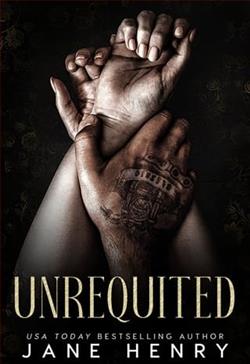Page 196 of The Daughters of Avalon
The vellum’ssurface shifted beneath Rosalynde’s fingertips, as though resisting with musculature. It was like a willful creature, bent upon making its point, every so oft turning pages of its own accord. It did so once again, settling once more on a page scribbled heavily with notes.
“I cannot read if you keep turning those pages,” complained Elspeth.
“I am not turning pages,” argued Rosalynde. “I do believeitmeans for us to read this page.”
“It?” Elspeth asked, lifting a brow.
“I don’t know. ’Tis the Goddess, I suppose. How can I know? I only know I am not the one turning the pages, and it always returns to this one.”
Showing Elspeth the page in question, she splayed the Book as wide as it would go, and urged Elspeth to peer over her shoulder. The entry was titled: The Duality ofWitchwaterWith Arcane Properties.
So, it appeared, you could, indeed, simulate elementalwitchwater. It could be created with the help of certain mushrooms, and there were a number of rare forms conducive to the transformation. And therefore, they could, indeed, finishthemotteand fill it withwitchwater, only not the form ofwitchwaterthat was summoned from theaether. Rather, transformedwitchwaterhad somewhat different properties. Instead of calling upon arcane forces, the transformed water was like a strange brew to be used for transmutation. For example, if a priest fell into a mixture, he might become a bandit. Or, if a stone fell into it, it could become a fish. However, if created in just such a manner, the results could be milder. For example, those who waded into themottemight simply become confused and forget themselves, so they forgot they were even fighting a battle. But, this brew was impossible to make as it was, because it called for items Rosalynde had never heard of before—like the scales of a fish called agwyniad, which was said to be native to the waters of Avalon.
Well, Avalon was long gone, so how was she supposed to acquire thisgwyniad? Or, barring the use ofgwyniad,she could use something called a “puffer fish.” But then, they would need finely crushed moon dust—and where by the love of night was she going to find moon dust? Also, to her complete horror, it called for a measure of human remains.
“What is this?” asked Elspeth, inquiring over a short verse that was scribbled sideways on the page—not in Morwen’s writing, and probably not their grandmother’s either. Bewitched and spellbound, this particular tome had been in existence for at least a thousand years.
“Only true love’s tears will save the newborn prophet,” Rosalynde read. “What do you suppose it means?”
Elspeth furrowed her brow. “How are we to know? Not even grandmamau allowed me to read the Book without supervision. She claimed the words written therein were too dangerous. Misinterpreted they could lead to unintended consequences.”
“Unintended consequences?”
Elspeth nodded. “She would not say precisely what or how or why, but I suspect our mother was transfigured by something within that Book.”
She tugged the Book out of Rosalynde’s hands and into her own lap, turning to another page. And, once again, like it had more than half a dozen times before, thegrimoirequivered, and the page returned to The Duality ofWitchwaterWith Arcane Properties.
“I cannot help but think this Book somehow wishes for us to glean something new from this page, because it cannot be the transmutation ofwitchwater. Avalon does not exist, and who in this world has ever seen a moon rock to crush into dust?”
“Indeed,” said Elspeth. “And what is a puffer fish?”
The words on the page seemed to ripple then glow, and Elspeth was compelled to reread the words: “Only true love’s tears will save the newborn prophet.” She shook her head, confused. “I cannot fathom what it means, but… somehow… I feel… moved by these words.”
“Moved?”
Elspeth frowned. “Yay,” she said. “Almost as though there is something I should do… or something I should know.”
Chapter
Twenty-Two
Well-rested and bathed after a night at Neasham, Seren nevertheless left the abbey in a pique. Wilhelm hadn’t lied to her, not precisely, but she was vexed that he had disdained to reveal the entire truth: He wasnotaffianced to her sister. And furthermore, Rosalynde was already wed to Giles de Vere—none other than her own betrothed!
Of course, it was no secret at all that Seren didn’t actually wish to wed Giles. He was not the man she pined for. And even so, Wilhelm had led her to believe that his brother meant to honor their betrothal, and that he, as a matter of due course, was honor-bound to return her to Giles—all this time he’d perpetrated a lie.
Never had she felt so muddled—relieved one moment, infuriated the other. And despite everything, she should be pleased beyond measure, because, now, she wouldn’t have to wed Giles. And truly, aside from Wilhelm’s lie, at the instant, there was little she should find to complain about, considering the circumstances: She was still breathing. Her belly was full.Jack was safe. She was clean and no longer dressed in foul smelling clothes. And, according to the nuns at Neasham, her sister was happily wed to the Lord of Warkworth.
There was more they had to say, of course, and though none of it was particularly unpleasant, it made Seren long to pull out every strand of Wilhelm’s beautiful hair—and aye, it was beautiful. Long and thick, it shone like ebony silk. If she were a cruel sort ofwitchof the sort folksgossipmongers like to fie on, she might give his horse a fright, then watch him tumble to the ground, muddying his clothes and hair. But she was not, and neither would she treat an animal so cruelly. But so far as Wilhelm was concerned—a pox on him!
And, by the by, the next time he considered eating a poisonous mushroom, she should let him. It would serve the deceiver right to spend every waking moment moaning and groaning on a pot.
Fie on him!
She muttered crossly beneath her breath, her appetite soured, despite that the sisters at Neasham had loaded their satchels with victuals aplenty for the journey. She settled a hand beneath her breast, grimacing over a burn in her breast.
“Art unwell, Seren?”
He’d said it with such concern that her anger wilted, if only slightly. She lifted a brow, and slid him a furious glance, then quickly averted her gaze, discomfited by her anger. “I am well,” she said. “Never better,” she lied.















